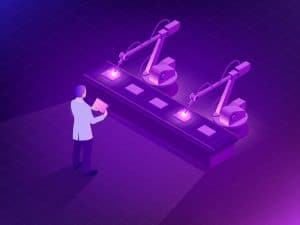
To set Industrial Data Scientists up for success, organizations need to invest in a robust, scalable, and secure Industrial AI infrastructure
The emergence of the industrial internet of things, AI, and machine learning (ML) algorithms have sparked new opportunities for digitalization and agility across industrial organizations. But one factor fueling this industry-wide digital transformation that’s equally as important, but received less fanfare, is a generational sea change occurring in the industrial workforce. Over the last several years, veteran workers have increasingly retired while their younger replacements, while more tech-savvy than generations past have lacked the operational expertise needed to manage unique and individualized processes and workflows within their site. This gap threatens the ability of industrial organizations to continue digitally transforming. Enter the “Industrial Data Scientist,” a new, critical pillar of the industrial workforce.
A mix between citizen data scientists and industrial domain experts, the Industrial Data Scientist, represents a best-of-both-worlds approach to a new kind of tech-driven, data-empowered domain expert. Unlike more traditional data scientists who come into the job with a background in computer science or software engineering, Industrial Data Scientists hail from elsewhere in the industrial sector – typically chemical, petroleum, or industrial engineering, before parlaying that expertise into a data science role.

The Industrial Data Scientist is on track to play a crucial role in organizations’ journeys to digitalization and the successful application of Industrial AI applications. With more industrial data at their fingertips than ever before, and access to a suite of AI, ML, and analytics tools, they can transform industry data into actionable insights to drive new value across the enterprise.
This is not to say that traditional data scientists are going anywhere; far from it! Their academic background is essential to developing the sophisticated ML models needed to solve complex problems. Over the course of long-term projects, these data scientists work on improving KPIs and generating new evaluation metrics that inform how the plant tracks growth.
The Industrial Data Scientist is a new role that complements, not replaces, their predecessors, one that bridges the gap between domain expertise and data science, supplying a new level of knowledge other data scientists don’t have. As a result, they’re able to incorporate their domain knowledge into data science projects with a focus on solving real-world problems in the field.
See also: Three-Fourths of Intelligent Factory Initiatives Stuck in Pilot Stages
Driving business value by closing the ideation-productization gap
Industrial Data Scientists advocate for the value that data science can bring to their organization. Their dual role as domain expert and data scientist promulgates work that could otherwise get trapped in siloed corners of the organization. Their ultimate goal is to build complete, high-performing, and sustainable AI and ML models that work across the enterprise to maximize productivity and efficiency, and in the long run, create an AI-driven, autonomous operation – a Self-Optimizing Plant.
By shining a light on data science through translating raw data into actionable insights, Industrial Data Scientists help their organizations speed time to market – something that’s particularly critical in a VUCA (volatile, uncertain, complex, ambiguous) environment – and create new opportunities for business value, edging out competitors in securing new levels of market share.
Rethinking the data science function also increases organizations’ productivity, automating the most tedious parts of the job. The benefit of that is twofold: it makes production outputs more efficient (and as a result, the ROI greater), and it frees up domain experts to dedicate more of their time and effort to more innovative tasks that add further value. To their frustration, organizations often find themselves stuck in the gap between coming up with ideas and converting them into viable productions. Industrial Data Scientists play a role that helps to shrink the gap between ideation and productization by applying their domain expertise to help bring innovative ideas over the finish line.
Setting up the Industrial Data Scientist for success through an Industrial AI infrastructure
While Industrial Data Scientists’ unique skillset can catalyze new and exciting innovation, they cannot get there entirely on their own. Several longstanding organizational challenges can block their efforts to build scalable, monitored, and secure Industrial AI models, including:
- Access to domain knowledge resources, subject matter experts, and vital data
- Working with other domain experts to improve and deploy models
- Determining the right set of AI and ML environments
- Scaling resources to meet data volume
- Overcoming data integration and mobility blockers
- Integrating cross-functional efforts to productize proofs of concepts
To set Industrial Data Scientists up for success, organizations need to invest in a robust, scalable, and secure Industrial AI infrastructure that fosters an environment where data scientists can bring AI and ML models to life and void the roadblocks that often send exciting ideas into the abyss. True success requires a full-stack approach that minimizes complexity, provides uninterrupted access to data, and supports a harmonious collaboration between domain experts and data scientists. One hand feeds the other: Industrial Data Scientists help to further hone AI and ML models, and the Industrial AI infrastructure underpinning those models eliminates roadblocks and enhances the data scientists’ work, all coming together to turn innovative ideas into tangible products.




























